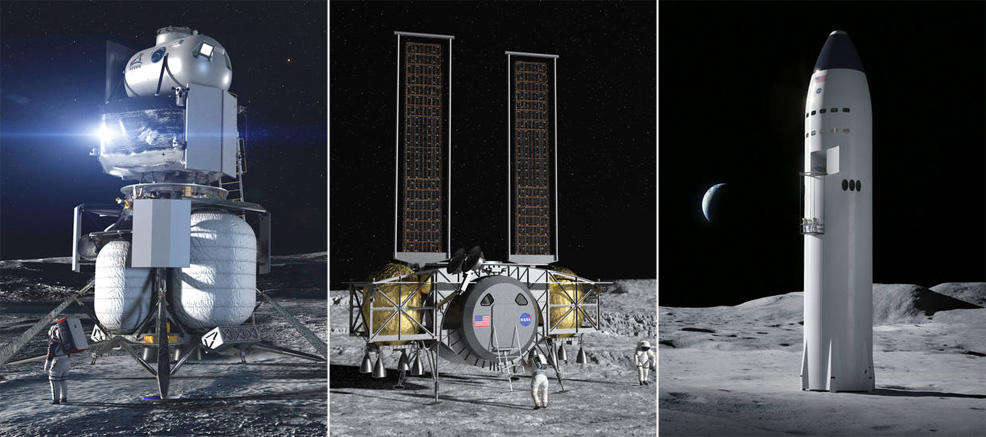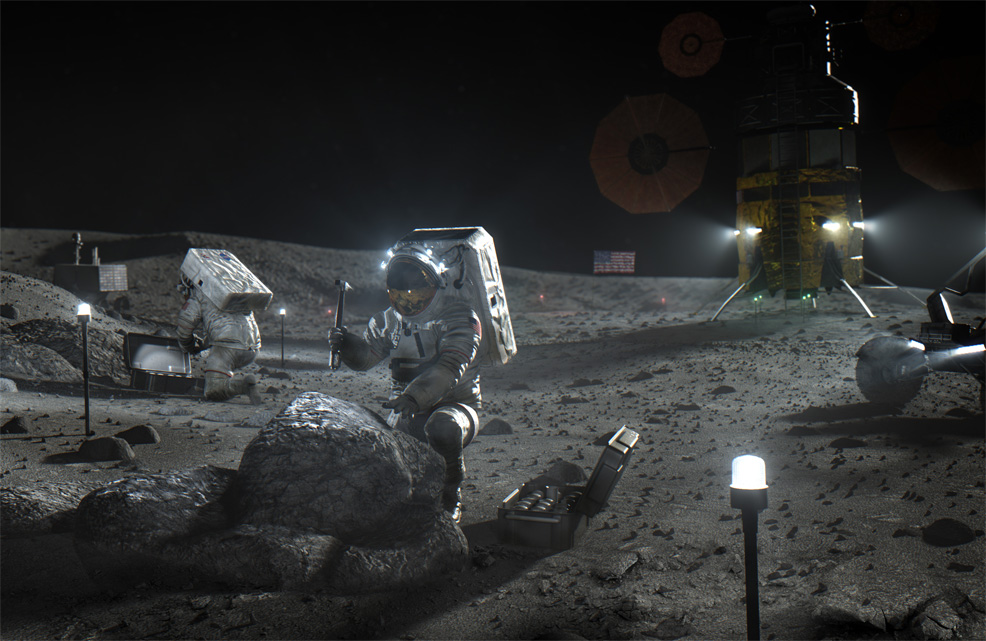- Luật
- Hỏi đáp
- Văn bản pháp luật
- Luật Giao Thông Đường Bộ
- Luật Hôn Nhân gia đình
- Luật Hành Chính,khiếu nại tố cáo
- Luật xây dựng
- Luật đất đai,bất động sản
- Luật lao động
- Luật kinh doanh đầu tư
- Luật thương mại
- Luật thuế
- Luật thi hành án
- Luật tố tụng dân sự
- Luật dân sự
- Luật thừa kế
- Luật hình sự
- Văn bản toà án Nghị quyết,án lệ
- Luật chứng khoán
- Video
- NGHIÊN CỨU PHÁP LUẬT
- ĐẦU TƯ CHỨNG KHOÁN
- BIẾN ĐỔI KHÍ HẬU
- Bình luận khoa học hình sự
- Dịch vụ pháp lý
- Tin tức và sự kiện
- Thư giãn

TIN TỨC
fanpage
Thống kê truy cập
- Online: 223
- Hôm nay: 198
- Tháng: 1621
- Tổng truy cập: 5245625
NASA selects companies to develop landers for human Moon missions
NASA has announced the selection of three U.S. companies – Blue Origin, Dynetics, and SpaceX – to design and develop human landing systems (HLS) for the agency's Artemis program, one of which is planned to deliver the first woman and next man on the Moon by 2024.
The HLS awards are firm-fixed price, milestone-based contracts with a total combined value of $967 million for the 10-month base period. The following companies were selected to design and build human landing systems:
• Blue Origin of Kent, Washington, is developing the Integrated Lander Vehicle (ILV) – a three-stage lander to be launched on its own New Glenn Rocket System and ULA Vulcan launch system.
• Dynetics (a Leidos company) of Huntsville, Alabama, is developing the Dynetics Human Landing System (DHLS) – a single structure providing the ascent and descent capabilities that will launch on the ULA Vulcan launch system.
• SpaceX of Hawthorne, California, is developing the Starship – a fully integrated lander that will use the SpaceX Super Heavy rocket.

"With these contract awards, America is moving forward with the final step needed to land astronauts on the Moon by 2024, including the incredible moment when we will see the first woman set foot on the lunar surface," said NASA Administrator Jim Bridenstine. "This is the first time since the Apollo era that NASA has direct funding for a human landing system, and now we have companies on contract to do the work for the Artemis program."
"We are on our way," said Douglas Loverro, NASA's associate administrator for Human Explorations and Operations Mission Directorate in Washington. "With these awards, we begin an exciting partnership with the best of industry to accomplish the nation's goals. We have much work ahead, especially over these next critical 10 months. I have high confidence that working with these teammates, we will succeed."
NASA's commercial partners will refine their lander concepts through the contract base period ending in February 2021. During that time, the agency will evaluate which of the contractors will perform initial demonstration missions. NASA will later select firms for development and maturation of sustainable lander systems followed by sustainable demonstration missions. NASA intends to procure transportation to the lunar surface as commercial space transportation services after these demonstrations are complete. During each phase of development, NASA and its partners will use critical lessons from earlier phases to hone the final concepts that will be used for future lunar commercial services.

Credit: NASA
"I am confident in NASA's partnership with these companies to help achieve the Artemis mission and develop the human landing system returning us to the Moon," said Lisa Watson-Morgan, HLS program manager at NASA's Marshall Space Flight Center in Huntsville, Alabama. "We have a history of proven lunar technical expertise and capabilities at Marshall and across NASA that will pave the way for our efforts to quickly and safely land humans on the Moon in 2024."
NASA's Artemis program – which has a total budget of $35 billion for 2020 to 2024 – aims to reveal new knowledge about the Moon, Earth, and our origins in the Solar System, as well as provide experience vital for any subsequent missions to Mars. The human landing system is an essential part of the agency's deep space exploration plans, along with the Space Launch System (SLS) rocket, Orion spacecraft, and lunar-orbiting Gateway station.
By FutureFutureTimeLine.net
Các bài viết khác
- Từ sự kiện Tổng biên tập báo TIME Greta Thunberg là Nhân vật của năm 2019 đến báo cáo Biến đổi khí hậu Phúc trình của IPCC báo động đỏ cho nhân loại 82021 (15.01.2020)
- Cú đánh đau đối với Trung Quốc: 3/4 nền kinh tế lớn nhất thế giới đã hoặc sẽ yêu cầu các công ty di dời cơ sở sản xuất khỏi nước này! (10.05.2020)
- Lý do giá nhà đất chưa giảm sâu mùa dịch (10.05.2020)
- Cục diện thế giới sau đại dịch Covid-19 qua góc nhìn của 12 nhà tư tưởng (10.05.2020)
- Tâm lý chờ "đáy" của người mua nhà đang khiến thị trường BĐS khó khăn hơn (10.05.2020)


















































 Yahoo:
Yahoo: 